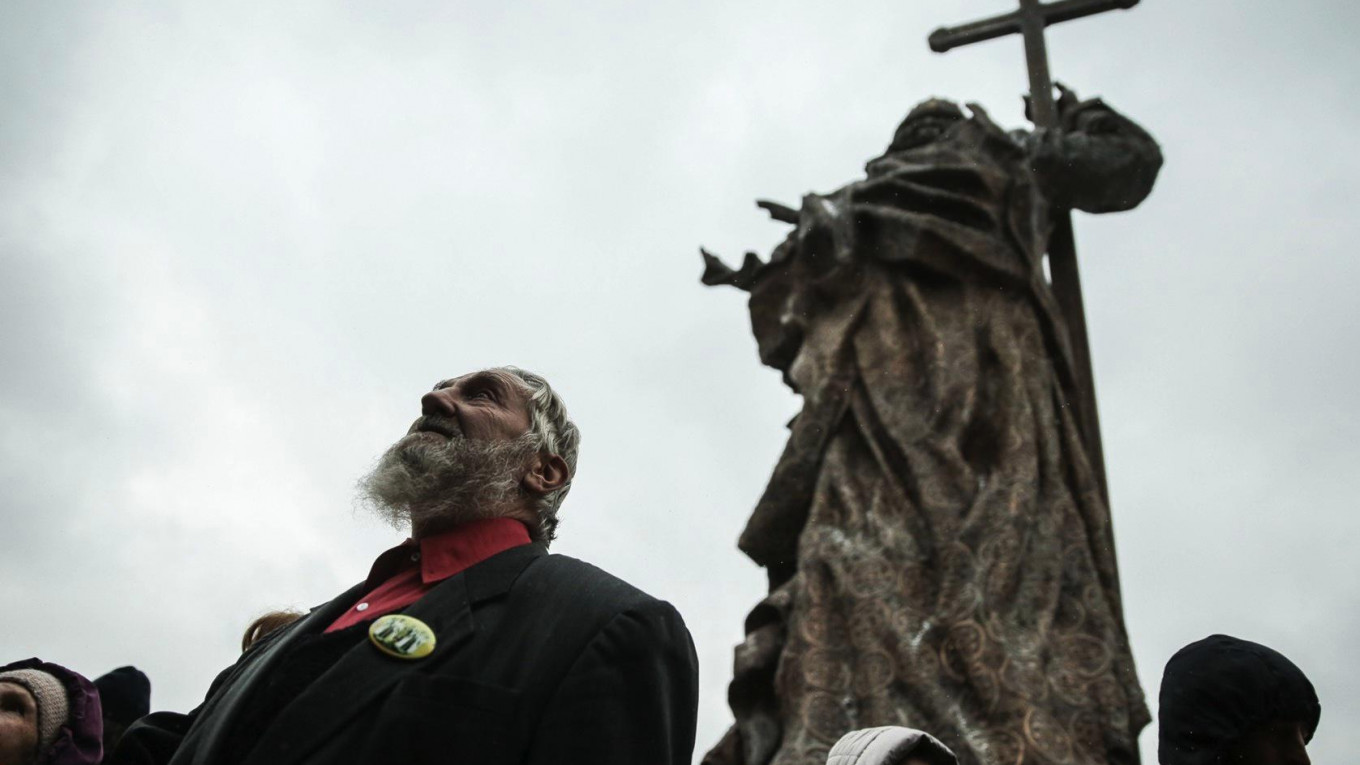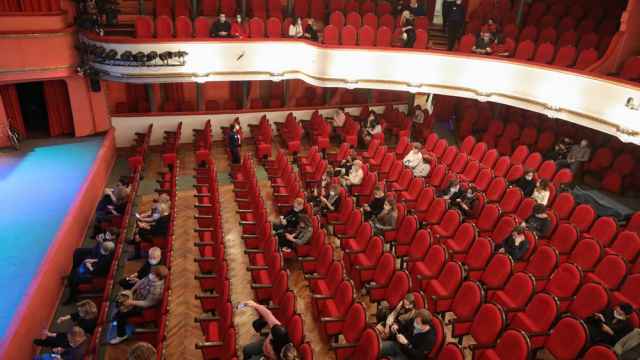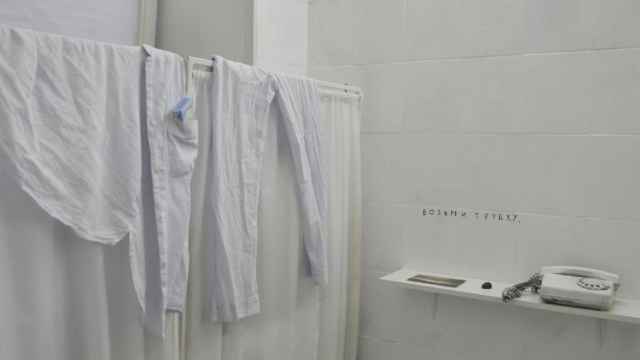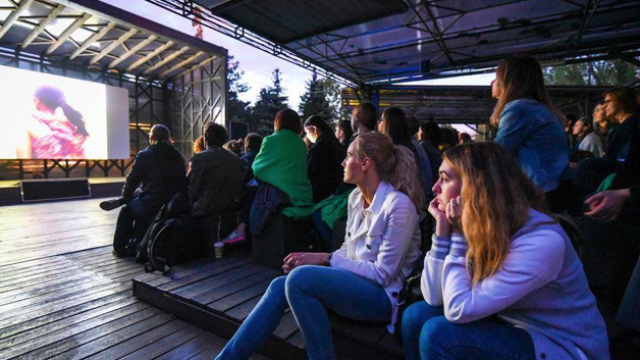We’ve been flipping back the pages of our 2016 issues, looking at the year in culture in Moscow: packed with film festivals, theater premieres, new musicals, thousands of concerts of every kind of music, and a blossoming of the art scene — from major exhibitions in museums to cutting-edge art in galleries, museums, clubs and on the street. We asked some of our favorite critics to tell us what they thought was the best of the year — the most positive and encouraging events or trends — and what was the worst — the most negative artistic trends or events, or simply the biggest flops. We were happy to see that there was more good than bad, which bodes well for the year to come.
The year had some great moments, like the non/fiction book fair.
People talk about the death of reading, but independent book publishers are on the rise and the public’s interest in literature is at its highest point since the Soviet era. Another great thing: the rise of Russian hip hop. A new generation of Russians has appropriated an art form from abroad and made it evolve in unexpected ways, just like their ancestors did with ballet, contemporary art, or rock music. Hip hop in Russia has turned into the most relevant kind of pop music, expressing the wit, fun, sadness and anger of Russian youth. And finally, the Moscow theatrical community united to support Konstantin Raikin in his conflict with the Ministry of Culture over censorship and conservative activists’ attacks on theaters.
The most negative event was the Prince Vladimir monument near the Kremlin, which ruined one of the most beautiful landscapes in the city. The monument is a sad and depressing emblem of the year 2016.
Yury Saprykin, journalist, The Moscow Times Publishing Co.
The most shameful event was the Russian Pavilion at the Venice Architecture Biennale.
The theme of Biennale was “Reporting From the Front,” but our pavilion was about the history of VDNKh Park, the pet project of Moscow’s chief architect.
The best events of the year were two well-curated exhibitions: Viktor Misiano’s project “The Human Condition” at the National Center of Contemporary Art, and the triple exhibition “Proof: Francisco Goya, Sergei Eisenstein and Robert Longo” at the Garage Museum of Contemporary Art.
Marina Antsiperova, arts reporter, Afisha Daily and Kommersant
I can’t think of any positive developments in 2016.
There have been quite a few negative ones, but the worst is the monument to Prince Vladimir on Borovitskaya Ploshchad. It’s horrible however you look at it: from a political point of view, as sculpture, or as urban development.
Yevgeny Asse, architect
The most important event was Konstantin Raikin’s painful speech.
He spoke at a meeting with President Putin, and there is some hope that it might bring some liberal elements to the conservative state arts policy.
The most negative event was the departure of Ivan Vyrypayev from Russia. Vyrypayev is our best contemporary playwright. He may go on writing in Poland, but his work at the Praktika Theater was especially productive over the last few years.
Pavel Rudnev, theater critic, professor, Russian State Institute of Theatre Arts
The best jazz event of 2016 was the Skolkovo Jazz Fest.
The summer festival took place in four venues in Russia and the Baltics, and each place had its own concept for the local audience.
The worst jazz events of 2016 were Yakov Okun’s Jam Sessions. He’s one of the top five jazz pianists in the country, and the Esse Jazz Club, where the sessions were held, is one of the best in Moscow. But they weren’t improve jazz sessions at all. Beautiful and talented female vocalists had to beg to sing a jazz standard.
Darya Bielecka, jazz journalist
The opera event of the year was "La Traviata" in Perm.
The production was by Bob Wilson with the fantastic orchestra of Teodor Currentzis and the soloist, Nadezhda Pavlova, who instantly became a new star.
The most disappointing event of the year was the La Scala tour in Moscow: a great brand with boring productions.
Yekaterina Biryukova, music critic, Colta.ru
The most negative event this year was definitely a merger.
The National Center of Contemporary Art and Rosizo merged, but it was like a hostile takeover. The good thing is that despite all that, many people refuse to give up and continue to launch new independent initiatives, even if there’s a lack of money or opportunity. Museum workers keep looking for ways to circumvent bureaucracy and organize great exhibitions.
Sergei Guskov, editor, Arts Section, Colta.ru
The greatest achievement this year was Kirill Serebrennikov’s film “The Student.”
The best thing about the film was that it was shown at major film festivals, like Cannes. This proved that a film can succeed without funding from the Ministry of Culture. The most negative development was the emergence of films that can’t be criticized due to the themes they explore, like “The Panfilov 28” about the defense of Moscow during World War II. If you criticize films like "The Panfilov 28” about the defense of Moscow during World War II. If you criticize films like this, you are immediately labeled a cynic and accused of disrespecting war heroes.
Anton Dolin, film critic
It was a good sign that most concerts of Russian-language bands were sold out.
The biggest disappointment was the cancellation of the largest electronic music festival in Russia — Outline — just a few hours before the first artists were set to come on stage.
Andrei Muchnik, arts reporter, The Moscow Times
Popular shows, like the Aivazovsky exhibition at the Tretyakov Gallery, were a positive sign
.... along with exhibitions like "Roma Aeterna: Masterpieces from the Vatican," Raphael at the Pushkin Museum, and Jan Fabre at the Hermitage. Even the complicated political situation didn’t intrude on cultural cooperation.
That said, it was sad that the complicated political situation did hamper some cultural cooperation, and several exhibitions didn’t take place. It’s also very sad that the public didn’t see any outstanding exhibitions of contemporary art.
Olga Kabanova, art critic
A Message from The Moscow Times:
Dear readers,
We are facing unprecedented challenges. Russia's Prosecutor General's Office has designated The Moscow Times as an "undesirable" organization, criminalizing our work and putting our staff at risk of prosecution. This follows our earlier unjust labeling as a "foreign agent."
These actions are direct attempts to silence independent journalism in Russia. The authorities claim our work "discredits the decisions of the Russian leadership." We see things differently: we strive to provide accurate, unbiased reporting on Russia.
We, the journalists of The Moscow Times, refuse to be silenced. But to continue our work, we need your help.
Your support, no matter how small, makes a world of difference. If you can, please support us monthly starting from just $2. It's quick to set up, and every contribution makes a significant impact.
By supporting The Moscow Times, you're defending open, independent journalism in the face of repression. Thank you for standing with us.
Remind me later.






